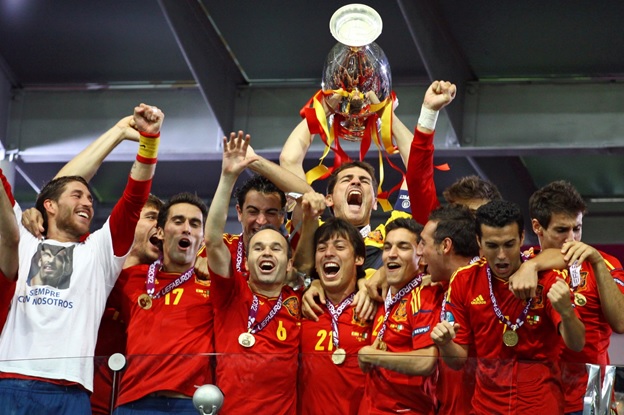Euro 2020 | Celebrating 60 years of European Championships

By the end of this month, the final groups for Euro 2020 will have been decided and all eyes turn to the tournament starting in June. This year’s final competition will be multi-hosted, commemorating 60 years of European Championships. 1960 marked the inauguration and since then, 10 different nations have won the trophy with Germany (formerly West Germany) and Spain the most prolific winners with three championships each. The football betting odds are currently in England’s favour, but let’s go back in time to some of the most iconic finals.
1964
In the 1964 European Nations’ Cup Final, Spain became the first host nation to win the tournament. They faced the maiden winners, the Soviet Union in the final and prevented them from becoming back-to-back winners. It took extra time for Spain to secure their place in the final, as they beat Hungary 2-1, while the Soviet Union hammered Denmark 3-0 at the Nou Camp.
The cauldron that is the Santiago Bernabéu in Madrid played host to the final, which was won within 90 minutes. A one-goal lead is always a fine margin, and so it proved again as the hosts were immediately pegged back after taking the lead through Jesús María Pereda – Galimzyan Khusainov equalising within two minutes to set up a thrilling encounter. It took six minutes for Spain to take the lead, and six minutes from time they restored their lead, through Marcelino.
After General Franco had withdrawn his team from the inaugural Championship of 1960, to win the tournament on their debut and as the host nation was a remarkable achievement and after denying the Soviet Union of consecutive finals wins, Spain would go on to manage the feat.
1976
The fifth European Championship Final in 1976 was memorable, as it was the first time a penalty shootout ensued. The finalists this time were Czechoslovakia, who hadn’t appeared since 1960 and West Germany, who had won the previous tournament. The Czechs had topped Group 1, with four wins from six matches, while West Germany advanced to the play-offs, despite three wins and three draws. In the play-offs, Czechoslovakia beat the Soviet Union, while West Germany knocked out Spain. It took extra time in both semi-finals for the finalists to secure their places.
Famously known as the Night from Belgrade, Czechoslovakia held a two-goal lead over their opponents, but West Germany hit back with a goal in each half, to ensure the match would go to extra time. As the tension grew, the goals dried up and so the final would be decided by penalties. The first seven kicks were converted, with Czechoslovakia leading 4-3, before the fourth German taker, Uli Hoeneß, ballooned his spot kick over the cross bar. Under pressure, Antonín Panenka chipped his penalty straight down the middle, with German goalkeeper Sepp Maier diving to his left. Not only did Panenka win the tournament, but his winning kick is famous in its own right. His name is forever synonymous with that particularly cheeky style of penalty.
2004
The Euro 2004 Final was interesting on so many counts. Not only did it feature Portugal and Greece, who played each other in their opening game of the tournament, but Greece massively defied the odds to win the trophy. In their group game, Greece had beaten the hosts 2-1, with Ronaldo netting a consolation in injury time, after Giorgos Karagounis and Angelos Basinas had given the Greeks a two-goal lead. Portugal topped the group, and knocked out England and the Netherlands en route to the final; while Greece beat France and the Czech Republic by a single goal – the latter coming as a golden goal in extra time.
It was another solitary goal that would be the difference between Greece and their opponents at the Estádio da Luz in the Portuguese capital. It took nearly an hour for the hosts to be stunned, as Angelos Charisteas headed in from a corner. Portugal’s attacking flair was stunted as Antonios Nikopolidis between the sticks stood firm and left frustrated, it wasn’t back-to-back silverware for coach Luiz Felipe Scolari who had won the World Cup with Brazil two years previous.
It remains the biggest shock in European Championship history.